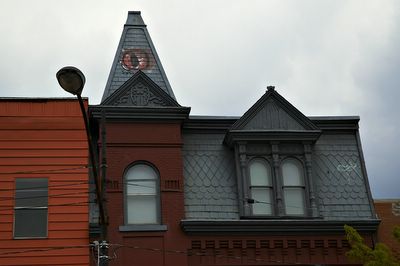Current stats:
4 games, .440 BA, 2 2B, 4 runs, 7 RBI.


Mmm... Spidey-Softball...

I'm full of tinier media!!!








(Posted via e-mail - again, please excuse any formatting problems)
MIT students have organized a convention for time travelers.
Why not, say some students at the Massachusetts Institute of Technology, who have organized what they call the first convention for time travelers.This definitely has a very Real Genius vibe to it. It's a quixotic and admirable flight of fancy, and I urge you all to extend an invitation to your descendants.Actually, they contend that theirs is the only time traveler convention the world needs, because people from the future can travel to it anytime they want.
(snip)
The event is potluck and alcohol-free - present-day humans are bringing things like brownies. But Mr. Dorai's Web site asks that future-folk bring something to prove they are really ahead of our time: "Things like a cure for AIDS or cancer, a solution
for global poverty or a cold fusion reactor would be particularly convincing as well as greatly appreciated."(snip)
A roped-off area, including part of an improvised volleyball court, will create a landing pad so materializing time-travel machines will not crash into trees or dormitories.
If they play their cards right, they might even get a demo of the motorized couch and the "pizza button".
Since the webmail I have to use for blogging via e-mail tends to
insert line breaks in inconvenient places, I can't really use
it to post anything that requires links to any but the tiniest
URLs (no, I can't access TinyURL either), and I'm leery of
even attempting to use block quote tags. Consequently, I can
pretty much only use the blog-by-mail to post random musings
that don't reference any specific article or blog post.
Today's random musing regards Bush's Social Security quagmire.
Of course, the most obvious question to ask is, If the polls
on Social Security privatization are so bad and getting worse,
why can't Bush just back off?
I think I have an answer to that, and it just tickles me pinko.
As we all know, one of Bush's signature traits is to Never
Admit Error, the corollary of which is the We-Have-Always-Been-
At-War-With-East-Asia Doctrine. Whenever this administration
has flip-flopped on a policy, they have always insisted that
the new position is the one that Bush has held all along, and
the flip-flop is somehow merely a refinement or restatement of
that position. Or else they just release it on Friday afternoon
and hope no-one notices. To do otherwise would be to admit that
their original position was a mistake.
Now this is the beauty part: Ask yourself, HOW? After 60 days
of barnstorming all over the country to pitch the virtues of
Social Security privatization, HOW is the White House going to
pretend that Bush has been in favor of the Social Security status
quo all along? Or slip a radical policy reversal under the radar
in such a way that no-one notices? My bet is that they'll do it
via solvency and "saving Social Security", and explain that the
president's number one priority has always been to protect SS's
finances, and he has always kept an open and pragmatic mind, blah
blah blah. Some people will actually even buy it. But for most
people, I think this is going to be far, far worse than
Hillarycare, which never threatened to take money away from
anyone's retirement. The media can only do so much - or so
little, as the case may be.
You know, if you use enough rope, the head will just pop right off.
Someone get this man some more rope, please.
That's all fine and dandy, and certainly not unwelcome, but it only affects one leg of the Republican power tripod. The other two legs, election manipulation (whether via
rigged electronic voting or just plain old gaming of voting rights and opportunities) and complicit media, are still in perfect health, seemingly unafflicted by the tumors of fair play and accountability. The Democrats are strangely passive on electoral reform, and they seem resigned to the media's preferential treatment of Republicans as a fait accompli. I had hoped that Dean would give them some fire on these issues, but I haven't seen it yet.
While I see little cause for hope on the electoral side, the Runaway Bride story and all the other trivial, distracting, contentless media circuses we have been bombarded with make me wonder if there is some point at which the media could be said to overreach; or, perhaps more accurately, underreach. Is it possible that in their blind efforts to race to the bottom common denominator, that they will begin to see a backlash, wherein more and more people become disgusted with the fluff and the spin, and begin to avail themselves of the copious alternatives
available in cable television's expanded basic wasteland?
Oh, the media hacks would misread the signs at first, and frantically crank up the volume while cranking down the content in a vain effort to rekindle interest, but that would only accelerate the rate of desertion. Any network with a safe harbor of solid, reliable, in-depth news could
clean up in such a scenario, although the greater probability is simply that fewer people would watch any news at all, at least until the news media finally caught on.
Or, alternatively, instead of driving people away in disgust, which is, quite frankly, difficult to do in this country, we could have the equivalent of an Enron or Watergate scandal. No, not Memogate, that was a minor screw-up in the grand scheme of things. I'm talking about evidence of a deliberate media whitewash or coverup of a big, important, damaging-to-Republicans story
(something like hard evidence of electronic vote tampering, or still more embarrassing revelations of just how phony the case for invading Iraq was, or how strong the warnings about 9/11 were), preferably with some juicy memos or phone calls showing that Rove or other significant Republicans were applying the pressure.
The effect might only be temporary, but for at least a few years, the media would be a lot more wary about getting into bed with the Republicans, or even appearing to be. Of course, the tricky part would finding a way to propagate an anti-media story without the help of the media - blogs can only do so much.
But hey, what do I know? I thought Mr. Personality (suitors in masks; hosted by Monica Lewinsky) would be the death of Reality TV...






On the other hand, the first trilogy still works quite well as a sweeping epic - good action, good effects, good story arc, even though Return Of The Jedi would have been a lot better without the Ewoks. (Best quote from the NYT article: "I fell asleep during the third one, when they brought out the Care Bears.")Like science itself, science fiction has evolved since the days of H. G. Wells and Jules Verne in the late 19th and early 20th centuries. Since the end of World War II, the genre has shifted its focus from space and time travel to more complex speculations on how the future, whatever its shape, will affect the individual.
That shift has only accelerated in recent years, as biotech and genetic engineering have moved to center stage in science and captured writers' imaginations, and as the lines between science fiction and other genres begin to blur. "We're starting to look inward, rather than outward," Mr. Morgan said. "There are exciting and scary things going to be happening in our bodies."
One problem with "Star Wars," science fiction writers say, is that it is not, ultimately, concerned with science, but rather with a timeless vision of good and evil. Mr. Lucas has said that his story, especially the journeys of his central characters from innocence through trials by fire to wisdom and acceptance, were rooted in Joseph Campbell's comparative studies of world mythologies, and especially in his popular book, "The Hero With a Thousand Faces."
Science fiction writers, however, are awaiting the release for a different reason. To them, "Star Wars" is nothing more than a space opera, and if the big guy in the black cloak is finally singing, that means the show is over. The saga continues no longer.
"That's the past of science fiction you're talking about," said Richard K. Morgan, the British cyberpunk-noir writer whose most recent novel is "Market Forces."
No-one seriously thinks that the end of Star Wars is going to usher in a new era of science fiction fims, do they? Effects-heavy blockbusters will continue to be box office gold, while challenging, thought-provoking science fiction films will continue to be alienating and off-putting box-office poison, and/or unsuccessfully marketed as something they're not (i.e., Solaris). Speaking as someone who reads a lot of science fiction books and watches a lot of science fiction films, I can attest that they are two completely different animals, and will probably remain that way. A large part of this is that the best science fiction books are all but unfilmable, except maybe as animation. Stephen Donaldson's Gap Series? David Brin's Kiln People or Uplift Trilogies? Octavia Butler's Xenogenesis Trilogy? William Gibson's Neuromancer? Any of Iain Banks' Culture novels? Anything by A.A. Attanasio or Greg Bear (okay, maybe not the Darwin's Radio books)? All great stuff, but I just can't see any of it translating to the big screen.
In the end, I suppose the question is, Is this such a bad thing? By their very nature, movies are visual and surface-oriented, and thus not the best instrument for probing depths and subtleties. It can be done to a certain extent, but anything that requires significant narrative explanation or exposition of inner thoughts is going to be tricky and not entirely successful (see: Dune). This is not unique to science fiction, either. Books and movies are just two completely different experiences, to be enjoyed on their own merits. And that's without even getting into the superior portability of books, or how easy they are to "pause" or "rewind," or how you can understand every word you're meant to understand, or how it doesn't matter how big or HD your screen is. And without getting into the shared social experience of watching a movie with other people, complete with pop and popcorn, maybe in the comfort of your own living room, maybe in a darkened room full of strangers and THX surround sound; or the poetry of great actors, directors, or cinematographers in action. Plus I would much rather watch kung-fu than read about it...


During the day and early evening, the lot feels like a crowded schoolyard, with restless, distracted men hovering over card games or swarming around a soccer ball, their shouts drowned out every 90 seconds by the roar of incoming planes. Haitian drivers favor dominoes played on the trunks of their cars, Russians clot around backgammon boards held up by trash bins and Hispanic drivers crouch between vehicles, throwing dice and sometimes wagering their hard-earned dollars.As the light faded on Tuesday night, an elderly Korean man jogged around the perimeter while groups of drivers wearing turbans power walked up and down a vacant taxi lane quietly reciting sacred Sikh verses. A charmless patch of concrete behind the restrooms sheltered a dozen kneeling men who prayed toward Mecca.
Cool slideshow, too.
Well, perhaps not in the white-collar corridors of corporate America. In fact the full beard - that is, one that stretches from the chin and mustache out to the sideburns - has become a kind of signifier for the glamorously self-employed. It is a favorite of Hollywood actors like Russell Crowe and Matthew McConaughey (who flaunt their whiskers as a kind of too-cool-for-school look when not shooting) and a key part of the brand identity of hot young fashion designers like Rogan Gregory of Edun, Josia Lamberto-Egan of Trovata and Alex Carleton of Rogues Gallery; and of musicians like Chris Robinson of the Black Crowes and Babydaddy of Scissor Sisters.Among other things, today's beard is a kind of nostalgic nod to counterculture heroics that peaked - at least in Hollywood - in 1978. That was the Year of the Beard, brandished by Kris Kristofferson as an outlaw trucker in Sam Peckinpah's "Convoy" and Steve McQueen in his serious-actor turn in "Enemy of the People."
Stubble is as far as I'm gonna go, I think. Beards would have to go out of style again before I would even consider growing one.
Actually, I'm not even sure I can. I might have to get beard plugs or a beard toupee or something...
Now that I peer in on workplaces for a living, I see that too many allow age to divide them. Workers align themselves like middle schoolers at a dance - the upstarts (or young go-getters, depending on your point of view) on one side, the experienced (or past their prime, ditto) on the other. This explains why I so often hear from employees who feel disposable and unappreciated. It also explains why the Supreme Court recently lowered the threshold for age discrimination claims to 40....This is not exactly a revelation, but I found the article intriguing because at 35-going-on-36, I feel like I am in transition from the youthful go-getter category to the seasoned pro category. I had never really given it much thought until a few weeks ago, when I was asked to meet with a couple of internal consultant/efficiency expert types. All of a sudden, I found myself in the role of the Experienced Voice Of Wisdom Who Knows How It Works, trying to rein in the Bright-Eyed Young Hotshots Full Of Wild Ideas. It was a dizzying moment of inversion.
There was a time in the working world when age correlated pretty much exactly with experience and, therefore, seniority. While I do not think things were better then, they certainly were less confusing. You started at a job young, then moved up the ranks until you became either important or obsolete. Then you retired, from the same company where you began.
...asked by his lead lawyer why a $25 million bonus from the company did not appear on his 1999 tax return, Kozlowski said he could not explain why."I just was not thinking when I signed my tax return that I had a $25 million loan forgiveness," Kozlowski said. "Year in and year out at Tyco, my tax returns for the most part had been correct. I didn't pick up on it."
Man, I wish I had enough money that $25 million could just... slip my mind.
